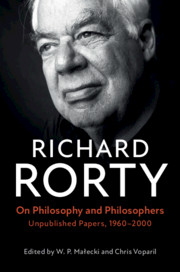Book contents
- On Philosophy and Philosophers
- On Philosophy and Philosophers
- Copyright page
- Contents
- Acknowledgments
- Note on Sources
- Introduction: Rorty as a Critical Philosopher
- I Early Papers
- II Later Papers
- 9 Philosophy as Epistemology: Reply to Hacking and Kim
- 10 Naturalized Epistemology and Norms: Replies to Goldman and Fodor
- 11 The Objectivity of Values
- 12 What Is Dead in Plato
- 13 The Current State of Philosophy in the United States
- 14 Brandom’s Conversationalism: Davidson and Making It Explicit
- 15 Bald Naturalism and McDowell’s Hylomorphism
- 16 Reductionist vs. Neo-Wittgensteinian Semantics
- 17 Remarks on Nishida and Nishitani
- Index of Names
9 - Philosophy as Epistemology: Reply to Hacking and Kim
from II - Later Papers
Published online by Cambridge University Press: 10 October 2020
- On Philosophy and Philosophers
- On Philosophy and Philosophers
- Copyright page
- Contents
- Acknowledgments
- Note on Sources
- Introduction: Rorty as a Critical Philosopher
- I Early Papers
- II Later Papers
- 9 Philosophy as Epistemology: Reply to Hacking and Kim
- 10 Naturalized Epistemology and Norms: Replies to Goldman and Fodor
- 11 The Objectivity of Values
- 12 What Is Dead in Plato
- 13 The Current State of Philosophy in the United States
- 14 Brandom’s Conversationalism: Davidson and Making It Explicit
- 15 Bald Naturalism and McDowell’s Hylomorphism
- 16 Reductionist vs. Neo-Wittgensteinian Semantics
- 17 Remarks on Nishida and Nishitani
- Index of Names
Summary
“Philosophy as Epistemology: Reply to Hacking and Kim” replies to criticisms of Rorty’s work made by Ian Hacking and Jaegwon Kim. While both expressed some sympathy with Rorty’s rejection of foundationalism about knowledge, they believed, pace Rorty, that philosophy can still say something interesting about knowledge that other fields cannot say. The paper tries to show that these two positions cannot be consistently held at the same time. Philosophy can either have something distinctive and interesting to say about knowledge, but only at the price of succumbing to foundationalism, or it can avoid foundationalism, but only at the price of being unable to say anything interesting and distinctive about knowledge. The paper also addresses a few more specific points made by Kim and Hacking in their criticisms, clarifying, correcting or refining Rorty’s position on issues such as conventions, truth-makers, and hermeneutics, as well as on Kant and Foucault.
- Type
- Chapter
- Information
- On Philosophy and PhilosophersUnpublished Papers, 1960–2000, pp. 145 - 156Publisher: Cambridge University PressPrint publication year: 2020

